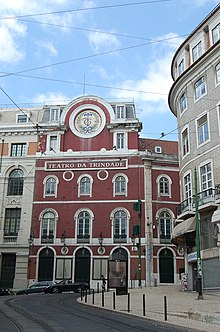Antonio Silva

António Maria da Silva (born August 15, 1886 in Lisbon , † March 3, 1971 ibid) was a Portuguese actor .
Career
Silva came from a simple background and started working as a sales assistant at a young age. He got enthusiastic about the theater early on and played as an amateur in his spare time. In 1910 he played for the first time on a professional stage, Tolstoy in the then Teatro da Rua dos Condes (since 1920 Cinema Condes ), with the theater company of Alves da Sila. In 1913 the ensemble went on tour to Brazil , where Silva stayed and played theater until 1921 and also got his first feature film roles in local silent film productions. There he met Josephina Barco, whom he married in August 1920.
Back in Lisbon, he played theater again without causing any particular stir. He achieved first notoriety since he played major comedic roles in the popular revues of Lisbon , first in 1927 in the play Agua-Pé in the Teatro Avenida (on Avenida da Liberdade , burned down in 1967).
In 1933 he played alongside Vasco Santana and Beatriz Costa one of the leading roles in the sound film A Canção de Lisboa ("Lisbon Song"). The film's huge hit made him famous overnight at the age of 47. Often together with Vasco Santana, he played many leading roles in films and revues, especially in the Teatro da Trindade and the Teatro Variedades .
From 1944 to 1946 he was engaged at the Teatro Trindade , with Ribeirinho and António Lopes Ribeiro , who contributed to the renewal of spoken theater in Portugal. Silva's role as the drunken Doolittle in George Bernard Shaw's Pygmalion was considered by theater critics to be a high point of his career. He then returned to revue and comedy, where he stayed until the end of his active career. In 1966 he was awarded the Order of St. Jacob of the Sword as an officer. In the same year he retired, interrupted only by a few television appearances. He died in his hometown of Lisbon in 1971.
reception
Silva was the most distinctive actor in the comedy-dominated Portuguese film of the 1930s and 1940s. In addition to his accented language and especially his intonation , it was his facial expressions and expressive hand movements that made him unique. His energy and liveliness in play also set him apart. He played both “good” and “bad” roles, mostly folk characters with their human weaknesses, but also men from higher social classes with their characteristic peculiarities. He often plays ambitious, devious and yet often folksy types who often attach small-minded goals with human motifs, and make the audience laugh through their pointed exaggeration and sometimes lovable charm and liveliness. With the end of the film comedies, the end of his career begins accordingly. The Portuguese film of the 1960s cannot offer him adequate roles, especially not the Novo Cinema , and so he only makes two meaningless films. His earlier successful films, however, are still popular today, and together with Vasco Santana no film actor has ever achieved comparable, lasting popularity in Portugal either before or after them.
Filmography
|
|
See also
literature
- A. Murtinheira, I. Metzeltin: History of Portuguese cinema. 1st edition, Praesens Verlag, Vienna 2010, ISBN 978-3-7069-0590-9 .
- Jorge Leitão Ramos Dicionário do cinema portugués 1962–1988. 1st edition, Editorial Caminho, Lisbon 1989, ISBN 972-21-0446-2 .
Web links
- Page with biography, filmography, pictures and video clips
- António Silva in the Internet Movie Database (English)
Individual evidence
- ↑ http://www.netsaber.com.br/biografias/ver_biografia_c_1046.html
- ↑ Jorge Leitão Ramos: Dicionário do cinema portugués 1962–1988 . 1st edition, Editorial Caminho, Lisbon 1989, pages 361/362.
- ↑ - ( Memento of the original from August 3, 2014 in the Internet Archive ) Info: The archive link was inserted automatically and has not yet been checked. Please check the original and archive link according to the instructions and then remove this notice.
| personal data | |
|---|---|
| SURNAME | Silva, António |
| ALTERNATIVE NAMES | Silva, António Maria da (full name) |
| BRIEF DESCRIPTION | Portuguese actor |
| DATE OF BIRTH | August 15, 1886 |
| PLACE OF BIRTH | Lisbon |
| DATE OF DEATH | March 3, 1971 |
| Place of death | Lisbon |


